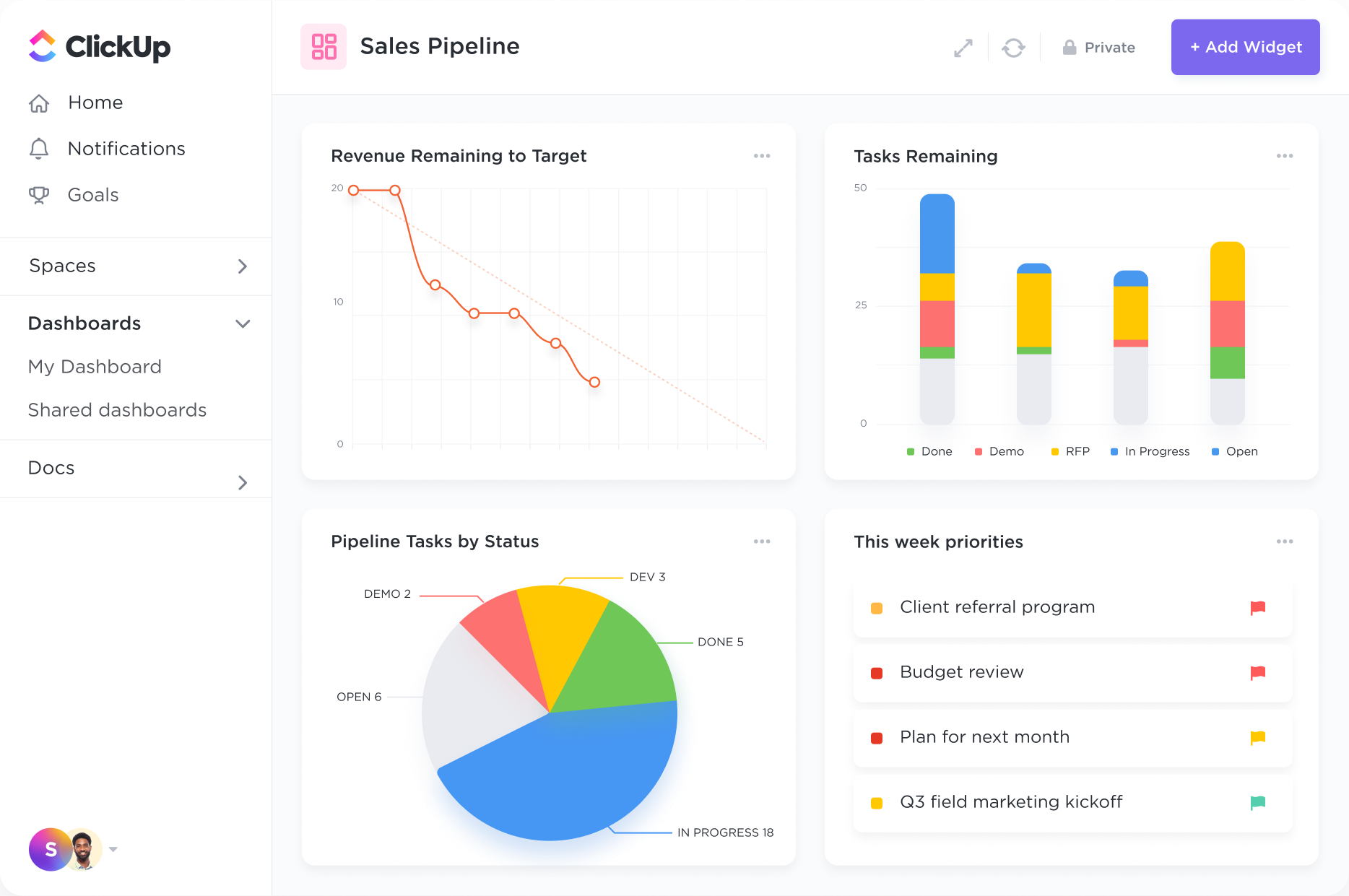Performance Dashboards
Analyze data for customer insights.
Create high-level views to monitor customer lifetime value, average deal sizes, and more. ClickUp's 50+ Dashboard widgets make it easy to visualize all of your customer data in one place.

Gantt Charts
Transform how you manage relationships with scientists by utilizing ClickUp's powerful CRM system. Streamline communication, track interactions, and organize data effortlessly to ensure seamless collaboration and enhanced productivity. With ClickUp, scientists can focus on their research while staying connected and informed every step of the way. Experience a new level of efficiency in managing scientific relationships today.
Free forever. No credit card.
Performance Dashboards
Create high-level views to monitor customer lifetime value, average deal sizes, and more. ClickUp's 50+ Dashboard widgets make it easy to visualize all of your customer data in one place.

Email Management
Eliminate silos and fast-track communication by integrating your emails with ClickUp. Collaborate on deals, send project updates to clients, and onboard customers with a single email hub.

Scientific research often involves collaboration with various stakeholders, including other researchers, institutions, and funding bodies. A CRM can help scientists track leads on potential collaborations, manage communication with partners, and nurture these relationships to drive research projects forward.
Securing funding is crucial for scientific endeavors. A CRM can assist scientists in managing grant applications, tracking funding sources, and monitoring deadlines. By centralizing this information, researchers can ensure they are on top of grant opportunities and maximize their chances of securing funding for their projects.
Monitoring publications and citations is essential for researchers to understand the impact of their work and track their academic influence. A CRM tailored for scientists can help manage publication data, track citations, and provide insights into the reach and relevance of their research within the scientific community.
Attending conferences and events is a key aspect of a scientist's professional development and networking. A CRM can assist in organizing conference schedules, managing event invitations, and tracking interactions with fellow researchers. This streamlined approach can help scientists make the most of networking opportunities and collaborations at scientific events.
Scientists often rely on specialized equipment and materials for their research projects. A CRM tool can be utilized to track equipment usage, manage inventory levels, and schedule maintenance tasks. By efficiently managing equipment and resources, scientists can optimize their research productivity and ensure smooth operations in their laboratories.
A CRM for scientists can serve as a central repository for research data, findings, publications, and experimental results. This centralization eliminates the need for multiple storage systems and ensures easy access to all team members involved in the research.
CRMs can track collaborations with other researchers, teams, or institutions, providing visibility into project progress, tasks assigned to team members, deadlines, and milestones. This feature improves coordination and ensures everyone is on the same page.
A CRM can help scientists keep track of grant applications, funding opportunities, and deadlines. It can also provide reminders for important dates, submission requirements, and progress reports, ensuring that researchers do not miss out on potential funding sources.
CRMs can assist in managing the publication process by tracking submission deadlines, journal requirements, reviewer feedback, and publication status. This helps researchers stay organized and meet publication deadlines efficiently.
For research labs, a CRM can aid in managing equipment, inventory, and supply orders. It can track equipment maintenance schedules, stock levels, and reorder points, ensuring that researchers have access to necessary resources for their experiments.
CRM software helps scientists by centralizing research data, facilitating collaboration among team members, managing experiments and results, tracking publications, and providing insights for better decision-making and analysis, ultimately improving research productivity and efficiency.
Scientists should look for CRM software with features like customizable data fields for research-specific information, integration with lab equipment and tools for streamlined data collection, project tracking capabilities, secure data storage compliant with industry regulations, and collaboration tools for team-based research efforts.
Yes, CRM software for scientists can integrate with other scientific tools and platforms, streamlining workflows, data management, and collaboration among research teams for improved efficiency and productivity.